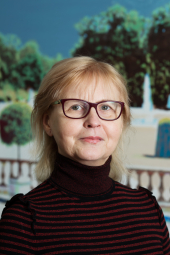The 9th department of the North Estonia Medical Centre’s Psychiatry Department primarily treats patients who experience a first psychotic episode. The 9th Department was opened in 1998. The department has 26 beds and the staff includes 5 psychiatrists, 8 psychologists, an occupational therapist, an art therapist, and 20 nursing and caregiver staff.
What is psychosis?
Psychosis is a psychiatric condition affecting perception of reality and thought processes. The treatments administered by our department use atypical antipsychotic drugs appropriate to the specific patient. If necessary, other pharmaceuticals needed by the patient are added to the treatment scheme to aid in better treating the illness.
Each patient is examined both in regard to physical health and psychological tests.
These meetings discuss treatment related problems and communication difficulties between the patient and family members. It also addresses how family members could best help their loved ones.
Undoubtedly the illness of a family member is a huge source of stress and thus these meetings also deal with the various difficulties family members might experience, which alleviates tension over the illness of their loved one. In addition, the psychiatrists and psychologists in our department meet with patients separately as well to discuss their psychological problems.
Group psychotherapy
Twice a week, group psychotherapy sessions are held to discuss noteworthy problems the patient has experienced in everyday life. Psychotic episodes often lead to a temporary drop in attention, memory, ability to concentrate, and other cognitive functions. To alleviate the condition and allow the cognitive faculties to recover faster, our department uses a special computer programme called Cogpack, which consists of exercises designed to improve attention, memory, reaction time and other cognitive functions.
In addition, metacognitive group sessions are held, for discussing different life situation and how to better cope with them. To deal with patient problems, our department uses art therapy exercises where creative activities and artistic means are used for expressing emotions and seeking solutions to problems. Occupational therapy is designed to preserve and promote patients’ active capacity to help those with impaired capacity better to take part in daily activities.
Organization of treatment in the department
The treatment given in our department generally lasts 21 days. This time may be shorter or longer depending on how a patient responds to treatment. After inpatient care, the patients in our department continue outpatient care at our department for up to two weeks, as needs dictate. During this time, patients attend appointments with members of the treatment team both accompanied by family members or alone to monitor changes in the status and discuss problems experienced by family members or the patient. After inpatient treatment ends, the patient can be referred to a rehabilitation programme at a suitable mental health centre that is closest to his or her home.
Academics and research
Our department has become a training area for University of Tartu residents as well as a practicum/internship site for University of Tartu and Tallinn University psychology students. The department staff and students from both of these universities have conducted much research here. The department has become an important centre in organizing multi-faceted treatment for first-episode psychosis. Our department employees have made presentations to colleagues in Estonia as well as at international scientific conferences.


